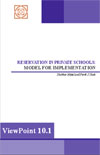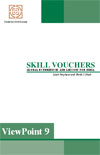| Research |
Comparing Public, Private and Market Schools: The International Evidence
Author: Andrew J Coulson
Journal of School Choice 3:31-51
Abstract: Would large-scale, free-market reforms improve educational outcomes for American children? This question cannot be reliably answered by looking exclusively at domestic evidence, much less by looking exclusively at existing "school choice" programs. Though many such programs have been implemented around the United States, none has created a truly free and competitive education marketplace, being too small, too restriction laden, or both. To understand how genuine market forces affect school performance, we must cast a wider net, surveying education systems from all over the globe. The present paper undertakes such a review, assessing the results of decades of international research comparing market and government provision of education and explaining why these international experiences are relevant to the United States.
... read more |
| Education News |
| |
Posh schools deprive poor of 25% quota
- The Times of India, 03 Apr 2014
LUCKNOW: Children of underprivileged families find doors closed in most private schools in Lucknow, according to state government figures. No school in the state capital has enrolled students belonging to weaker sections and disadvantaged groups in class I, thereby, showing disregard to the Right to Education (RTE) Act which mandates 25% free seats in class I for underprivileged. |
Online admissions for RTE seats likely to start on April 7
- DNA, 4 Apr 2014
The online admissions for the 25 per cent seats reserved under the Right to Education Act, 2009 are finally expected to start in the city on April 7. The final schedule will be ready in a day, assured BMC authorities. |
Why Education Spending Doesn't Lead to Economic Growth
- Bloomberg Businessweek, 7 Apr 2014
It is college acceptance season, and letters with financial aid offers attached are dropping on doormats nationwide. Many students and an even greater number of parents are facing the sticker shock associated with tertiary education. As college prices rise—the average annual cost hit $18,497 in 2010-11, according to the National Center for Education Statistics—the question inevitably arises: Is it worth it? |
Education: Bill to regulate private schools yet to be tabled
- The Express Tribune with the International New York Times, 8 Apr 2014
LAHORE: Education Minister Rana Mashhood Ahmad Khan told The Express Tribune that the government now intends to bring forth a regulatory bill for private schools in April. Senior education department officers had earlier claimed it would be tabled in March. Khan said the delay was due to “legislative processes”. |
Foreign universities open India centres
- Live Mint and the Wall Street Journal, 7 Apr 2014
New Delhi: Although foreign universities are yet to open independent campuses in India because of regulatory hurdles, some global higher education brands are opening research centres to capture a portion of the growing market of executive education and other research partnership opportunities. |
Economist identifies useful education reforms in India
- Cornell Chronicle, 3 April 2014
Jim Berry believes that economics can be a force for good. His projects in India use economic studies and principles to uncover the best ways to alleviate poverty and inform policy. His most recent work shows that although government officials in developing countries tout increases in enrollment as a sign of improvements in primary education, test scores show actual learning hasn’t matched this progress. |
|
|
|
Poll
What would work better to universalize secondary education in India?
To vote click here.
|
|
|
Factoid
98 percent of schools in the Punjab charge a monthly fee between Rs. 50 and Rs. 1,000. Source: All Pakistan Private Schools Management Association survey
|
|
Publications
 
|
| |
|
|


